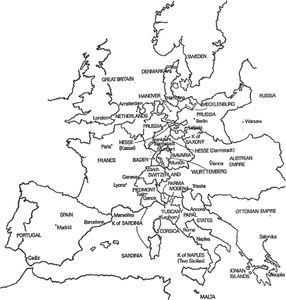6 The Road to Marseilles
Between November 1821 and August 1822 eight shiploads of volunteers left Marseilles for Greece. Over two hundred men took passage in these specially chartered vessels; others went independently, paying their own passage. They came from all parts of Europe: France, Italy, the Netherlands, Switzerland, Denmark, Sweden, Poland, and the Austrian Empire. There were a handful from Spain and Britain, and one American. The vast majority were Germans. As 1821 had been the year of the Italian volunteers, 1822 was to be the year of the Germans. In every region of the Confederation there were men who responded to the call and made their way to Greece despite all efforts on the part of their governments to stop them. Hundreds of others set off but changed their minds before it was too late to turn back.
More is known about the volunteers of 1822 than about any other group of the twelve hundred or so Philhellenes who took part in the Greek War of Independence. The majority were men of education and status in their own countries, men with a sense of service, men who felt that they were selflessly joining an honourable cause. No less than thirty of them have given accounts of their experiences. The third expedition in particular had nine authors among the forty or so volunteers.1
A young concert musician, who was also a doctor, read in a newspaper at Mannheim a call for German volunteers to assist in the regeneration of Greece and to take part in a sacred crusade against Islam. The call, he says, went through him like an electric shock; Fate wanted his arm for the cause of Freedom; he recognized a presentiment he had felt since boyhood; God was leading him; the finger was pointing to the East.2 An army officer from Mecklenburg read the proclamation of Professor Krug and decided to give his ‘Gut und Blut’ to the sacred cause of Greece’s struggle against tyranny. He had been looking for some means of again becoming an active soldier; had thought himself of going but until he read Krug’s call it had seemed to be an impossible wish.3 A Prussian theology student was swept away by the idea of fighting on the graves of Epaminondas and Themistocles.4 The son of a schoolmaster at Dessau saw it as his duty to ‘plant the tree of Freedom in the land where it first grew two thousand years ago’ and ‘like a knight of old’ he left home without saying a word.5 A young Württemberger from a well-to-do family pestered his parents for months to be allowed to go and finally obtained their assent when the newspapers began to publish accounts of the great victories of the Greeks.6 An official in the Hamburg Government read the call of Thiersch, Krug, Dalberg, Iken, and others, sold up his furniture to raise money, and set off.7 The students of Copenhagen raised money to send a few of their number and arranged to have further money sent to Marseilles. A young poet and painter from Schleswig was touched by the Greek enthusiasm in. its most extreme form. He actually set out with the intention of being killed, seeing a vision of himself standing by an altar wearing vestments with the cross on his breast a target for the Moslems’ bullets—’the blood would be the fruit of Freedom’.8
The movement attracted a few cranks and neer-do-wells. On the whole, however, the reasons for going were straightforward. A Danish student who later became a distinguished scientist describes his own feelings which were probably shared by most of his comrades:
I was completely dissatisfied with my position in Copenhagen. I was a nobody and seemed likely to remain so…. Added to this discontent at home was a strong desire to see the world. This inclination was partly instinctive like that of migrants but it had also been fed by reading travel books. Also a kind of warlike enthusiasm took hold of me and was daily fired by newspaper descriptions of the fighting between the Greeks and the Turks (unfortunately far too often incorrect). I had learned to admire the Greeks from my schooldays, and how could a man inclined to fight for freedom and justice find a better place than next to the oppressed Greeks? Against all this there seemed to be a decisive barrier in the impossibility of finding the necessary money for the journey. But here I was seduced by the continual newspaper reports on Greek Committees throughout Germany, Switzerland, and the South of France, which not only supported Philhellenes with travel money to Marseilles or Livorno, but also took them by sea to the Morea where they would at once be organized into regular corps according to the agreement between the Committees and the Greek Government, and looked after as regular soldiers.9
The professors and churchmen who had published the appeals and plans for volunteers to go to Greece were taken aback by the response. Men began to appear at Aschaffenburg and Boitzenburg and other places where it was reported that the volunteers were being collected. They found no one to receive them. Some of the volunteers then made the journey to Leipzig to present themselves to the famous Professor Krug himself, but he did not know what to do with them. Having belatedly agreed to support the government, he advised the volunteers to go home, but when they insisted on their desire to go to Greece, he suggested they should go to Professor Thiersch at Munich. And so they set off for Munich. Thiersch was equally unable to help them; all he could do was recommend them to the Societies at Darmstadt, Stuttgart, and Frankfurt, the only ones in Germany which were still operating more or less openly.
For several months in late 1821 and early 1822 young men were to be found wandering over Germany looking for the organizations they had read about that were to send them to Greece. Students left their universities, officers gave up their commissions, clerks and apprentices obtained release from their contracts, the unemployed and the disillusioned from many walks of life found new hope, and set off to join the new crusade. Rumours and false stories appeared in the newspapers to keep alive their enthusiasm. It was said that a Crown Prince (unspecified) was going to take command of a German expedition.10 A Nuremberg newspaper reported that ‘a great court5 (unspecified) had issued instructions to its diplomatic representatives abroad to issue passports to those wanting to go to Greece with no questions asked.11 Two hundred students from Bonn were reported to have enrolled in a volunteer army to be paid for by a huge subscription raised in the town.12 A treasury was said to have been established at Marseilles to pay them and the Greeks were eagerly awaiting their services. Many governments issued directives to try to stop the volunteers crossing the frontiers, but they were easily evaded. The border officials were often sympathetic to the Greek cause and turned a blind eye. Passports could be obtained by inventing some convincing reason for wanting to go abroad. Soon a regular underground network came into existence. The word was passed around about which prominent citizens of a particular town were friendly to the cause and they secretly collected subscriptions.
The volunteers moving from town to town called on these men—schoolmasters, clergymen, lawyers, merchants, officials, and others—and were given money and sent on their way with letters of recommendation to the next town. In Germany all roads led to Darmstadt, Stuttgart, and Frankfurt, but after that the going was easy. The volunteers made their way up the Rhine into Switzerland, where virtually every town had an active Greek Society, and then crossed into France to the Lyons Society, and then down the Rhone to Marseilles. The French officials seem to have been instructed to let them pass without question.
The South German and Swiss Societies, because they alone could act openly, and because they were conveniently situated on the philhellenic route, found themselves thrust into the leadership of the whole movement. The Societies of Stuttgart and Zürich made arrangements to act as coordinators for all the Societies in Germany and Switzerland. They also arranged for a German banking house established in Marseilles to act as their agent for chartering ships and despatching the volunteers.
In the nature of things, the organization was very loose. The Societies had no control over the volunteers who presented themselves. Men would appear from remote towns in Germany or from even further afield with a letter of recommendation from some semi-clandestine Greek Society and very little else. Often they had set off with no more money than had been collected by passing round the hat after a students’ meeting, or an advance of wages from a sympathetic employer. Subsidizing these men on their way drained the Societies’ resources.
On the road to Marseilles there was a carnival atmosphere. The richer volunteers gave money to their poorer companions and paid for their passage in carriages and boats on the rivers, but most went on foot. Many joined simply for the fun of the journey. Volunteers were constantly meeting old friends that they had met earlier along the route. Little groups formed and broke up and joined up again. Some of the volunteers had extravagant uniforms made to their own design—one took seven uniforms decorated with badges inscribed ‘Freedom or Death’.13 The innocent were regularly fleeced and they sometimes showed their dislike of innkeepers by breaking up their furniture and leaving without paying. There was a good deal of drinking and singing of ‘freedom’ songs. Ordinary travellers found it difficult to find accommodation. ‘In different parts of the country’, wrote an English traveller, ‘I met with numerous companies of young men on foot, with knapsacks at their backs, on their way to Marseilles, there to embark for Greece. These parties appeared to be composed chiefly of young German recruits and runaway students, and from the boisterous enthusiasm which they generally manifested, it was my endeavour always to avoid them as much as possible. On the roads this was easily managed, but not so easily at the inns, where it sometimes happened that I was unavoidably one of their party’.14 This traveller was attacked in a brawl in an inn at Lausanne when he was foolish enough to become involved in a political argument with a few of these volunteers.
Many of the volunteers dropped out on the way but several hundred reached Marseilles. Many went no further. Although the South German and Swiss Societies were willing to pay the costs of the voyage to Greece and to provide arms and supplies, their resources were too limited to cope with the numbers. Rich volunteers could pay hotel bills as they waited for a passage, but the majority had virtually no money at all by the time they reached Marseilles. The Societies paid every man daily a small sum which was just about enough to live on but often weeks passed before enough money could be collected to charter a ship. A large empty house was hired as a kind of barracks for the less well-to-do. The volunteers hung around the harbour, some took work in the docks and in the quarries. Two cafes—one, the Café du Parc, was renamed the Café d’Hypsilanti—were taken over as the headquarters of different groups.* Some were content to sit there drinking and playing cards for weeks on end. The French secret police employed spies to keep an eye on them and two proscribed revolutionaries who tried to pass themselves off as volunteers for Greece were arrested and shot.16 An offer from the ruler of Algiers to take a few mercenaries into his service was indignantly rejected. The Greek colony remained largely indifferent.
Every few weeks, as soon as enough money could be collected, a small ship was chartered to take the volunteers to Greece. The German bankers in Marseilles made the arrangement—the contract simply bound the captain of the vessel to land the men in some port in Greece in Greek hands. Food for the voyage was provided and sometimes arms were bought, but nothing else. There was no pay. There were no arrangements to receive them in Greece. The Societies’ responsibility ended as soon as the ship reached Greece.
It was hardly an ideal preparation for a military expedition and many volunteers prudently swallowed their pride and went home. But the rest pressed on, trusting naively in their youth and strength and in the accounts they had read of the glittering commands awaiting them in Greece. Over half were retired officers, captains and lieutenants from the vast armies demobilized after the Napoleonic Wars, men who were out of work or bored with peacetime service. Some found they had taken part in the same battles on different sides. There were half a dozen counts and barons from France, Germany, and the Scandinavian countries and numerous officers from prestigious regiments of the French and Prussian armies. A few, whose military experience had been confined to garrison service in the smaller German militias, were inclined to add some elaboration to their record and others considered it helpful to add ‘von’ to their names. Non-commissioned officers became lieutenants and subalterns majors. Iron crosses and other medals were borrowed from fathers to add to the effect. These innocent aids to morale were always being exposed, however, as new volunteers appeared who had known the men at home.
The others who were not officers came from all walks of life: doctors, lawyers, clerks, students; a merchant from Luxemburg who hoped to set up a branch in Greece;17 a Bavarian china manufacturer who wanted to found a factory;18 two brothers from a cadet academy;19 several boys still in their mid-teens;20 a theology student from Tübingen;21 an out-of-work French actor;22 a forestry worker from Württemberg;23 a Swiss professor of Ancient Greek who came from London;24 a Swiss watchmaker;25 a hairdresser from Frankfurt;26 a dancing-master from Rostock;27 a French fencing teacher who pretended to be a cavalry officer;28 a gruff recruiting sergeant from Brunswick;29 an old soldier from Baden deafened and stupefied by a life-time of fighting;30 a Spanish girl dressed as a man.31
As always throughout the war, many of the volunteers were men whose lives had been ruined by the political upheavals: Poles who had fought in the French army, refugees from the revolutions in Italy, and French Bonapartists. Some of the German students flaunted revolutionary colours. A rich Hungarian officer,32 who had served in the Neapolitan Army and was now living in retirement on the French Riviera, had been suspected of consorting with the Carbonari and decided to join the Greeks. Others had personal reasons for looking for military glory. A German baron,33 who heard that his love intended to marry someone else, crossed Germany to dance with her at a ball and then set out for Marseilles. Another German of good family, travelling under a pseudonym, hinted at some dark but honourable affair that obliged him to leave home.34 A Swiss medical student had recently been expelled from university.35 A rich Englishman, the son of a general,36 had been dismissed from the British Navy for challenging a superior officer to a duel.
Early in 1822 a young man appeared at the door of the Stuttgart Greek Society and claimed in deaf-and-dumb sign language to be Prince Alepso, a Greek prince from Argos, who wanted to go back to his country and his family.37 He was a highly excitable, even hysterical, man much given to drunkenness, but this was put down to natural anxiety. He was subjected to various tests in Stuttgart by the Deaf and Dumb Institute and judged to be genuine. A few officers were asked to conduct him to Greece, and Alepso rode as they marched alongside. On the way to Marseilles he was greeted with reverence in the towns they passed through. A lady gave him a purse made of pearls, full of money, another lady gave him a gold ring. The volunteers found him extremely difficult to deal with, especially when in one of his tantrums he attempted to kill someone on board, threw the gifts into the sea, and appeared suicidal. But they stuck with him in accordance with their oaths in spite of his outbursts of hate against them. It was only after several months when the party reached Argos that his pretence broke down and he was overheard speaking in German after a bout of drinking. It turned out that he was a watchmaker’s apprentice from Alsace who had run away from home after a family quarrel.
All these men passed through Marseilles on their way to Greece in the few months of hectic philhellenic activity in 1821-2, though they were not all there at the same time. For many there were weeks of waiting for a passage to be arranged, and occasionally there were more than a hundred volunteers In Marseilles all claiming to want to go to Greece. It was hardly surprising, with such a motley international collection of idealists, adventurers, and ragamuffins, that they should find it hard to co-operate among themselves. They were forever splitting up into hostile groups. At different times the French quarrelled with the Germans, the Danes with the Germans, the North Germans with the South Germans, the students with the soldiers, and so on. There were perpetual squabbles over money as the poor tried to sponge on the rich. The young idealists, busily revising their knowledge of Greece from their books, withdrew in disgust from their brash drunken comrades. The more thoughtful protested at the slender resources of the Societies being dissipated in gambling and on the women of the town.
There were no arrangements for appointing leaders. Every volunteer was an individualist and the cry was heard that, since they were to fight for Freedom, it was wrong to set one man above another. But even the most ethereal and the most independent had to recognize that someone would have to co-ordinate the basic arrangements of dealing with the bank, paying the ships’ captains, and distributing the supplies. Elections were held from time to time to select commissioners but none of the leaders was able to keep everyone’s loyalty for more than a short time. Some of the ships sailed with no one in charge at all.
Duels were frequent. Honour was a concept highly prized by almost everyone, but it meant different things to different people. The German students with their highly stylized code of conduct were forever taking offence at alleged insults, and there were a few trouble-makers who deliberately provoked quarrels to show off their swordsmanship. There were plenty of genuine points of honour to dispute over according to the conventions since so many of the volunteers were not quite what they claimed to be. Much of the quarrelling revolved round points of procedure on whether or not a particular man was of the right social status to give or receive challenges. But a great deal also seems to have been prompted by simple national hatreds and racial prejudices. The more sober volunteers tried to keep the peace and patch up the disputes, but deep grudges were formed and a few men swore that they would kill their adversary as soon as they landed in Greece.
All were sustained by the belief that their fortunes would be made as soon as they arrived. Even before they left Marseilles there was great rivalry to secure the best commissions, and the more forceful characters appointed themselves to high commands in the Greek forces on the strength of doubtful commendations from their local Societies. A French retired naval officer became a ‘Greek admiral’, a subaltern from a small German town guard was the ‘Commander of the Greek Artillery’. They began to recruit their friends into a ‘staff’.38 The competition for mythical positions caused many quarrels. The worst was between Chevalier, a Swiss dandy who claimed to have been a major in the Hanseatic service (in fact he had been a corporal) and Lasky, an overbearing Prussian hussar officer who was also a poet.39 Both claimed the right of dispensing appointments in the Greek army and new arrivals in Marseilles took them at their word and divided into two parties. The quarrel came to a duel with pistols—a method of fighting reserved for the most severe affairs of honour. Lasky was shot in the head and was lucky to survive. A Danish medical student40 performed a trepanning operation and thereafter Lasky sported a silver plate in his skull. Although this added even more to his imposing appearance and to his prestige, it seems likely that his brain had been damaged and he was never the same man as before.
Early in 1822 the Societies decided to appoint a general to take command of the volunteers. They chose General Normann,41 a Württemberg count who was related by marriage to Professor Orelli, a leading figure in the Zürich Society. Normann, in deciding to go to Greece, had much the same mixture of motives as many lesser men who followed him. On the one hand, he genuinely believed in the Greek cause and had a strong sense of duty and dedication; on the other, he was a casualty of the turbulent times in which he lived and had his own personal reasons for wanting to prove himself. His life had been a battleground of conflicting loyalties. Although born in Stuttgart, he had received his early military experience in the Austrian service. In 1803, however, when his native Württemberg became an ally of France, he was recalled and two years later was at war with his former Austrian comrades. To change sides was a painful ordeal for a young officer, but in 1813 there occurred a new crisis which was to ruin his life. Now he was a famous major-general, already at the age of twenty-nine one of the most senior commanders of the Württemberg army, a veteran of innumerable campaigns, an officer of the Legion of Honour, and a personal friend of Napoleon whom he greatly admired. But the political situation was changing rapidly. After Napoleon’s disastrous Russian campaign (in which Normann served), his German allies began to desert him and join the Allied cause. In May, Normann’s forces fell in with a party of Prussians who were fighting on the Allied side. Normann was uncertain what to do, but during confused parleys shots were fired, a battle broke out, and several hundred Prussians were killed. Shortly afterwards Normann, under pressure from his officers, led his troops over to the Allied side, but by now it was both too soon and too late. The King of Württemberg, still loyal to the French, regarded his action as treasonable, and the Allies had little sympathy for a man who had so recently been their enemy. Normann was disgraced, cashiered, and forced to live in exile. His friends recognized that he had been the victim of a situation to which there was no honourable solution, but he could not live down the disgrace of having fired on Germans fighting for their independence. From that fateful day in 1813 he devoted himself to attempts to vindicate his reputation.
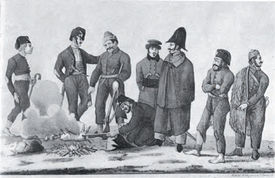
9a. Two Philhellenes with members of a Regiment Tarella.
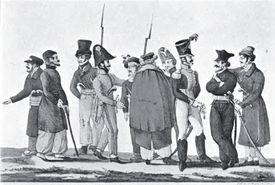
9b. Some of the Philhellenes of 1822.
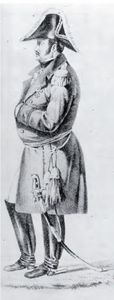
a. General Normann
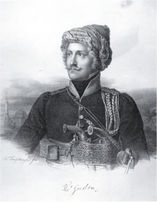
b. Colonel Gordon
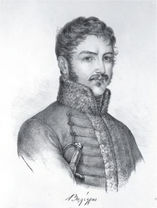
c. Baleste the fi rst Commander of the Regiment.
10. Philhellenic leaders.
Normann’s situation has many parallels. During a war it is common for generals to be unjustly treated, but afterwards it is difficult to interest public and official opinion in making amends. Wars cause so many unjust deaths and unjust injuries that an unjust loss of reputation seems unimportant.
Normann allowed himself to be persuaded that he could wipe out his past by leading an army of volunteers to liberate Greece. Some of his comrades of ten years before, now stiff and grey and bored, called on him at his castle and reminded him of the heroic days before 1813 when they had been successful dashing young officers. Other volunteers on the way to Marseilles were put up at the castle and helped to persuade him. The Societies promised men and money but their resources were being quickly dispersed in helping individuals on their road to Marseilles. As the displeasure of the Northern German governments made itself felt and the rate of money subscriptions tailed off, it was argued that Normann could revive the interest in the cause by publicizing his intention to lead the volunteers. Normann hesitated for a long time. He wanted to appear in Greece in the full splendour of a General with a staff and an army. He was conscious that he was no longer young and fit for harsh active campaigning and he still suffered from old war wounds. At last he decided that his duty was to go to Greece and he took leave of his sorrowing family and set off for Marseilles.
He took command of the fourth expedition to set sail. It was the best equipped which had left so far. There were two hundred and fifty people on board, mainly returning Greeks including women and children but also about forty-five European volunteers, the usual mixture of Germans, Frenchmen, Italians, and Poles from all kinds of backgrounds. One of the party,42 who went as Normann’s adjutant, described the scene as the ship set sail, with plentiful quotations from Schiller and Alfieri: ‘The cannon thundered a farewell. Two hundred ships in Marseilles harbour saluted as Normann’s ship sailed out. A thousand voices shouted “Long live Greece”, “Long live the brave warriors of Germany”’.
The news of Normann’s departure had the expected effect. More volunteers set out from all over Europe to Marseilles hoping to join the main party in Greece. As ever the reports in the press were hopelessly exaggerated. Hundreds of officers were said to have gone; another five hundred paid by Dalberg were waiting at Livorno; a citizen of The Hague had contributed a million and a half florins to the cause.43
But now the volunteers actually in Marseilles began to hear the first hints that they should not believe all that they heard and read. Men arriving in the town were accosted by strangers warning them not to go. The local Greek bishop stated publicly that volunteers would not be welcome. Already disillusioned volunteers were straggling back to Europe. In April several French officers who had been present at the fall of Tripolitsa arrived back at Marseilles and were so horrified at the idea of others following in their footsteps that they decided to publish an open letter in Marseilles describing their experiences. A deputation of Germans interviewed them as they stayed in quarantine and a curious record of the conversation was published in a Marseilles newspaper. Only a few points survived the difficulties of communicating in a foreign language with men isolated in the lazaret—that the Greeks were a despicable, cowardly, and ungrateful race; that there was no cavalry, no artillery, no supplies, no pay; that Turkish girls were taken as slaves; and that the Greeks had threatened to cut off the Franks’ heads at Patras. The Greeks of Marseilles spread a story that the returning French officers had been expelled from Greece for misconduct and were merely venting their spleen. The officers produced letters from the Greek Government commending them for their brave services at Tripolitsa and Nauplia but they could make little impression on public opinion which remained unshakeably favourable to the Greeks. The Germans waiting to leave were unimpressed. They argued to themselves that the French army had always insisted on extravagant commissariat arrangements unbecoming to true soldiers, and decided to press on. The French, seething with frustration, decided to publish a pamphlet but were persuaded to drop the idea by their old patron who promised them money if they would do so. The French secret police in any case soon intervened and compelled the returned officers—who were Bonapartists—to leave France. They drifted off to join revolutions elsewhere.44
A Prussian officer who had sailed in the first expedition from Marseilles and had been present at the massacre at Corinth also arrived back at Marseilles during 1822. He too tried to warn his comrades and published in Marseilles itself an account of his experiences. The city, he wrote, is still full of enthusiasts on their way to the abyss. ‘You will only find misery, death, and ingratitude. Do not believe what you are told in Germany and Switzerland, but believe an old soldier’.45
Another Prussian officer on his return to Marseilles later in the year also published a book there to tell of his experiences.46 It was dedicated to the Youth of Europe as a warning:
When I left my country I thought that with my twelve years’ experience as an artillery officer I would be able to help the Greeks and obtain a rapid advancement. Reading the sublime history of their fathers was the talisman that charmed me to take an interest in these degenerate children … I said to myself, You are going to fight under the standards of Achilles alongside the heroes of the siege of Troy. But the Ancient Greeks no longer exist. Blind ignorance has succeeded Solon, Socrates, and Demosthenes. Barbarism has replaced the wise laws of Athens…. The Greeks do not honour the seductive promises they made to foreigners in the newspapers.
This officer described the barbarities which he witnessed at Tripolitsa many months after the capture of the city: a young Turkish girl ‘beautiful as Queen Helen of Troy’ being summarily shot by Colocotrones’ nephew; a Turkish boy led around by a rope, thrown into a ditch, stoned and stabbed, and then while still alive being tied to a plank and burned; three Turkish children being slowly burned to death over a bonfire while their mother and father were forced to watch; Hypsilantes standing helplessly by while atrocities were committed and weakly trying to explain away his shame to the Europeans by telling them that as old soldiers they should know the trade of war.
But an idea that had captivated Europe for centuries could not be so easily turned back by plain accounts of direct experience. The magic of the philhellenic dream continued to claim the youth of Europe. Somehow they managed to convince themselves that for them it would be different and the ships, laden with volunteers, continued to leave Marseilles on their way to Greece.
Footnote
* The girl behind the cash desk at the Café du Parc was a great favourite among the volunteers. She was murdered one night by a tall blond Piedmontese who took the money and disappeared.15




